- লিঙ্ক পান
- X
- ইমেল
- অন্যান্য অ্যাপ
CONDITIONS
29 Things You Think Cause Cancer but Don’t
Seems like every day we hear about something else that will kill us. Today, you get to read about the things you thought were deadly—but are harmless.
Plastic water bottles
 iamshutter/Shutterstock
iamshutter/Shutterstock
Back in the 2000s, you might have read that plastic contains diethylhexyl adipate (DEHA), a supposed carcinogen. According to the American Cancer Society, DEHA is not always in the plastic used to make water bottles—and even if it was, the U.S. Environmental Protection Agency (EPA) says DEHA “cannot reasonably be anticipated to cause cancer.” Likewise, the International Agency for Research on Cancer (IARC) doesn’t list DEHA as a carcinogen. Here are 30 foods that can help prevent cancer.
Microwaving plastics
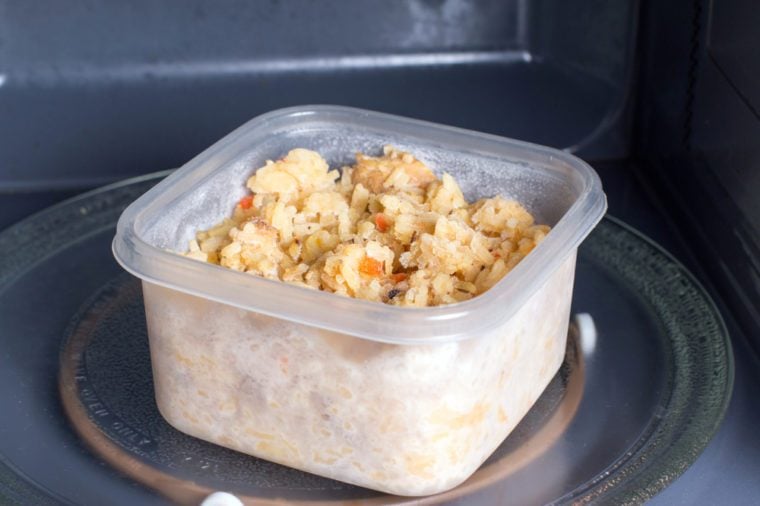 Ahanov Michael/Shutterstock
Ahanov Michael/Shutterstock
Since at least 2002, people have been afraid to microwave foods in plastic containers and plastic wrap under the mistaken impression that it will release cancer-causing chemicals into their food. The U.S. Food and Drug Administration (FDA) strictly regulates plastic food containers and approves the ones marked “microwave safe.” This means the plastic is free of DEHA and dioxins, according to the ACS.
Microwaving anything
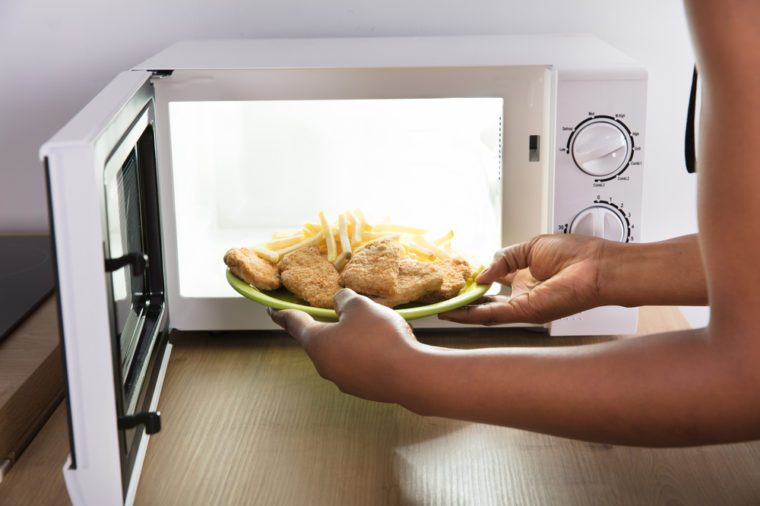 Andrey_Popov/Shutterstock
Andrey_Popov/Shutterstock
Some people are still suspicious of microwaves, believing the cooking method makes food radioactive. Not so, according to the ACS. The group explains, “Microwave ovens can cook food, but they do not otherwise change the chemical or molecular structure of it.”
Not so fast, say the suspicious-minded person: Doesn’t a microwave emit radiation? It does not: “Microwave ovens are designed so that the microwaves are contained within the oven itself,” the ACS states. When used according to instructions, there is no evidence they pose a health risk to people.
Dryer sheets
 Naama Elitzur/Shutterstock
Naama Elitzur/Shutterstock
Dryer sheets soften your clothes and eliminate static cling—while they silently give you cancer… Wait, what? Not so fast: The unscented sheets appear to be safe. However, the scented versions may contain a toxic chemical. The problem is that the Federal Trade Commission doesn’t require identification of individual fragrance components. If you’re concerned, consider using unscented sheets or switch to a brand that discloses fragrance components; Seventh Generation, for example, uses only essential oils.
Here are some little things you can do every day to prevent cancer.
Dental fillings
In case you didn’t know, those cavities you had filled a while back likely have mercury in them. But they also have other metals, including silver, tin, and copper. According to the American Dental Association, the combination of these metals makes the fillings, known as dental amalgams, completely safe. “It’s important to know that when combined with the other metals, it forms a safe, stable material,” the ADA says. What’s more, the type of mercury used in the fillings isn’t the same type (methylmercury) that has been shown to cause health problems.
Sugar
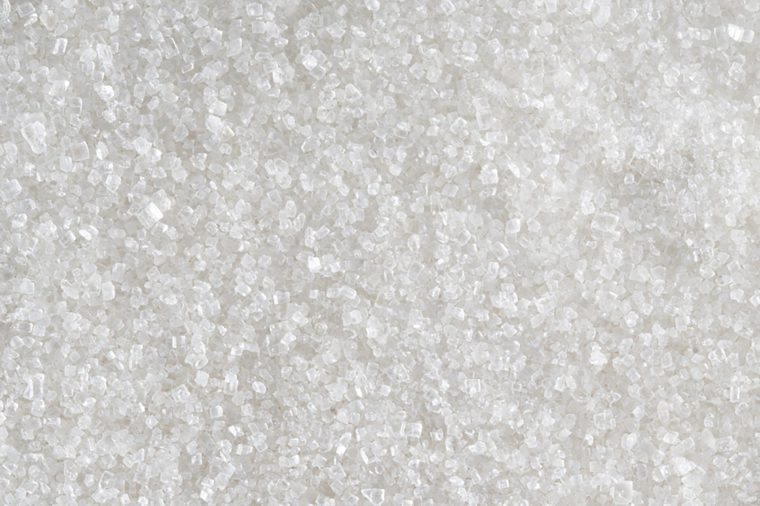 Oleg Kozlov/Shutterstock
Oleg Kozlov/Shutterstock
Sugar does a lot of bad things to your body, but sugar doesn’t cause cancer. This is true despite research suggesting that cancer cells consume more glucose (blood sugar) than normal cells. You actually need some sugar in your diet—it’s necessary for your immune system, according to Anton Bilchik, MD, chief of medicine and gastrointestinal research at John Wayne Cancer Institute at Providence Saint John’s Health Center. Feel free to ignore these other myths about cancer, and in particular breast cancer.
Artificial sweeteners
 SpeedKingz/Shutterstock
SpeedKingz/Shutterstock
While some early research found a link between artificial sweeteners and bladder cancer in laboratory animals, the National Cancer Institute reports that further research failed to confirm the findings. However, everyone could benefit from cutting back on the sweet stuff: Artificial sweeteners can be harmful to your health by messing with your metabolism and raising your risk of type 2 diabetes, high blood pressure, and heart disease.
Lucky Charms
 P Maxwell Photography/Shutterstock
P Maxwell Photography/Shutterstock
Lucky Charms has an interesting list of ingredients, including trisodium phosphate (aka tribasic sodium phosphate; TSP). It’s found in many food items and it’s also in cleaning products and paint thinners—yikes, right? Not so fast: TSP is a leavening agent similar to baking soda (also in foods and cleaning products). The amounts in Lucky Charms (and other foods) are so tiny that there is no cancer threat.
Candy canes
 karen roach/Shutterstock
karen roach/Shutterstock
You may have heard that candy canes contain the scary-sounding titanium dioxide—but that’s just a pigment that turns candy canes (as well as sunblock and toothpaste) brilliant white. Titanium dioxide is not a known carcinogen.
Nutella
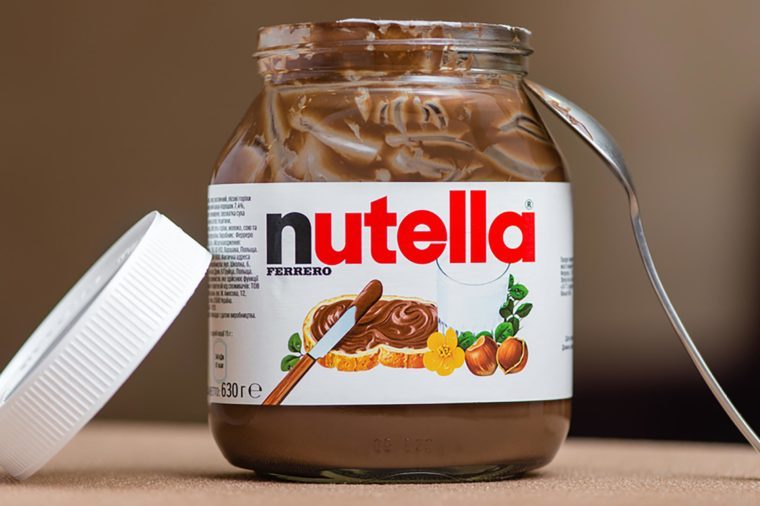 Ivan Svyatkovsky/Shutterstock
Ivan Svyatkovsky/Shutterstock
Parents everywhere panicked when the news that Nutella could cause cancer hit (both for their kids and themselves, no doubt). Everyone take a deep breath: Nutella does contain palm oil which, when heated above around 400 degrees F, can be cancerous. As the makers of Nutella are quick to point out, they never get their product that hot. However, Nutella may not be as healthy as you might hope.
The wax on apples
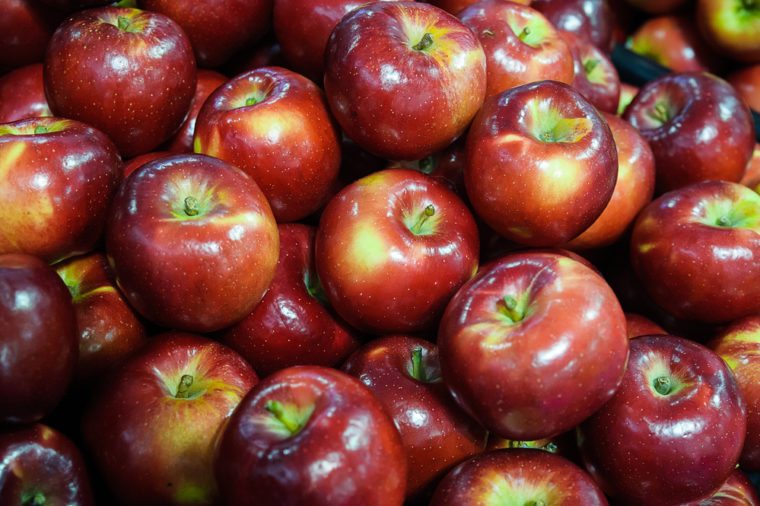 Ana Iacob Photography/Shutterstock
Ana Iacob Photography/Shutterstock
You’ll often find that apples are coated with wax—it’s to extend shelf life and to make the fruit look enticing. Although some will claim the wax is carcinogenic, it most certainly is not. While there are some credible concerns about carcinogenic pesticides that might be trapped under the wax, you can take care of that problem by rinsing fruits with water and scrubbing them with a soft brush. Or opt for organic apples, which are less likely to have been treated with toxic chemical pesticides.
Don’t miss these completely reassuring things scientists wish you knew about cancer.
Disposable chopsticks
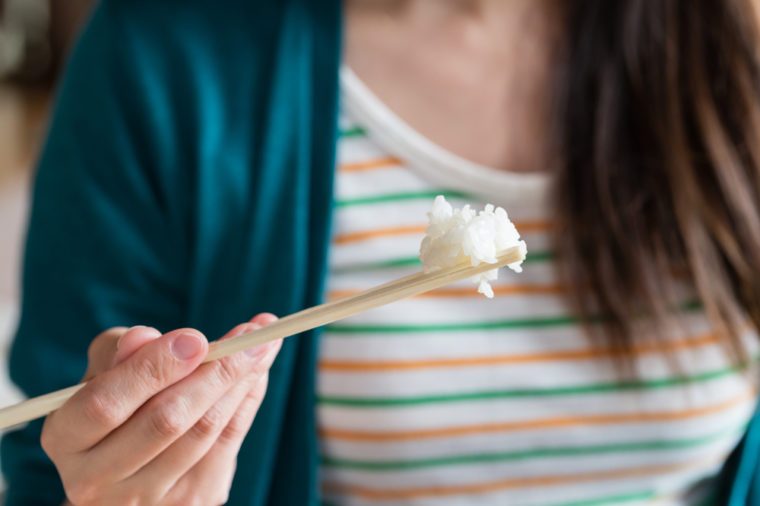 Scott Dumas/Shutterstock
Scott Dumas/Shutterstock
Around 2005, an Internet rumor began circulating that disposable wooden chopsticks contain carcinogens, including sulfur dioxide. One catch: Sulfur dioxide is not a carcinogen. If you don’t want to ingest sulfur dioxide (as some people are sensitive to it), you might consider using reusable chopsticks—or a fork.
Cold water
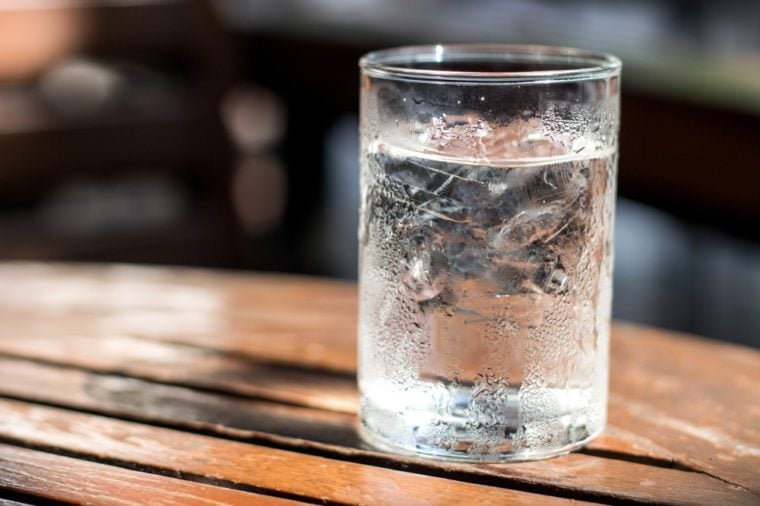 MR.Yanukit/Shutterstock
MR.Yanukit/Shutterstock
This is a bizarre one: A viral rumor has been going around that drinking cold water after meals can cause cancer—it doesn’t. The email claims that cold water interferes with digestion, and… somehow that causes cancer? Sometimes you’re better off hitting the delete key: No research anywhere backs up this silly claim. The bigger issue tends to be that people don’t drink enough water; here’s how to get more into your day.
Over-boiling your water
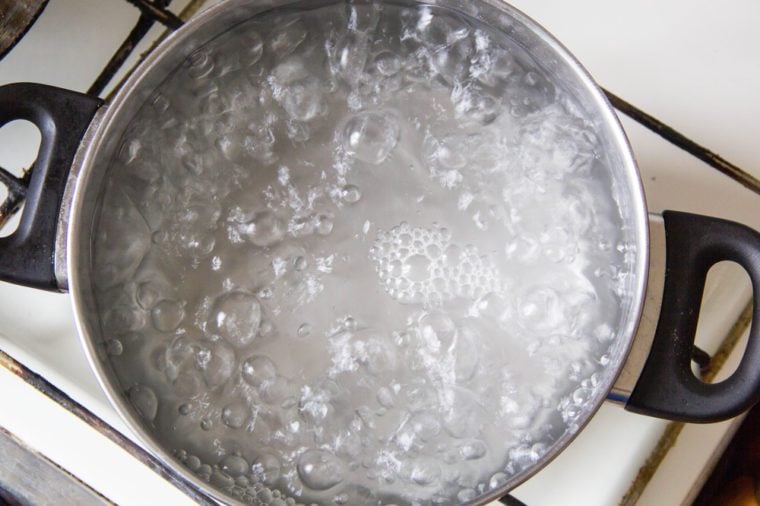 dashtik/Shutterstock
dashtik/Shutterstock
Supposedly if water is boiled for too long or reboiled, chemical compounds form, including carcinogens like arsenic. The reality is that the risks posed by reboiling water are minimal.
Turning on the AC in your car
 BonNontawat/Shutterstock
BonNontawat/Shutterstock
The claim is that turning on your AC after your car has been running will spew benzene—a carcinogen—into the cabin. Nope. There are exactly zero studies demonstrating that well-maintained cars contain or produce benzene through their air conditioning system in sufficient quantities to have any carcinogenic impact.
E-cigarettes
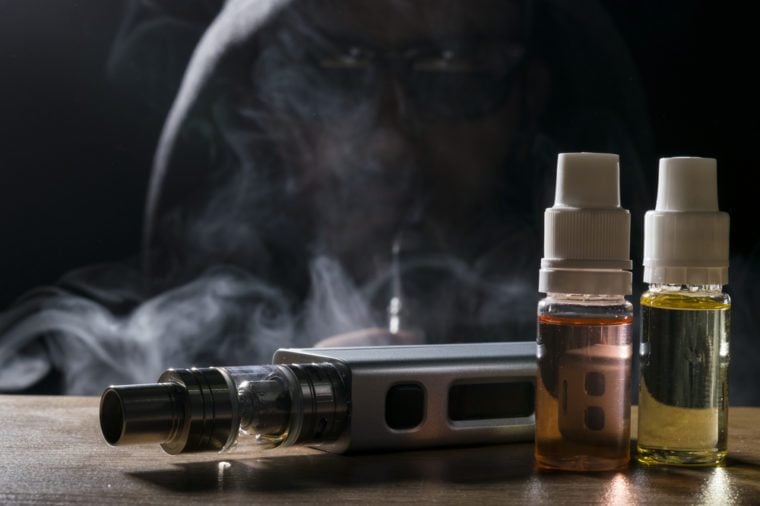 Hazem.m.kamal/Shutterstock
Hazem.m.kamal/Shutterstock
Even though a few years back a Japanese study found electronic cigarettes contain more carcinogens as tobacco cigarettes, don’t panic: It turns out the study was seriously flawed. In February 2017, the U.K.’s National Health Service cited a study suggesting the use of electronic cigarettes is far safer than smoking.
If you do decide to try this alternative to smoking, keep these e-cigs side effects in mind.
Dental fillings
 Andrey_Popov/Shutterstock
Andrey_Popov/Shutterstock
Any cavities you had filled a while back are likely to have mercury in them. Too much mercury can be bad for your brain, but it isn’t a carcinogen; what’s more, those mercury fillings also included silver, tin, and copper. According to the American Dental Association, the combination of these metals makes the fillings, known as dental amalgams, completely safe. Here are some other things your dentist wishes you knew.
Hair dye
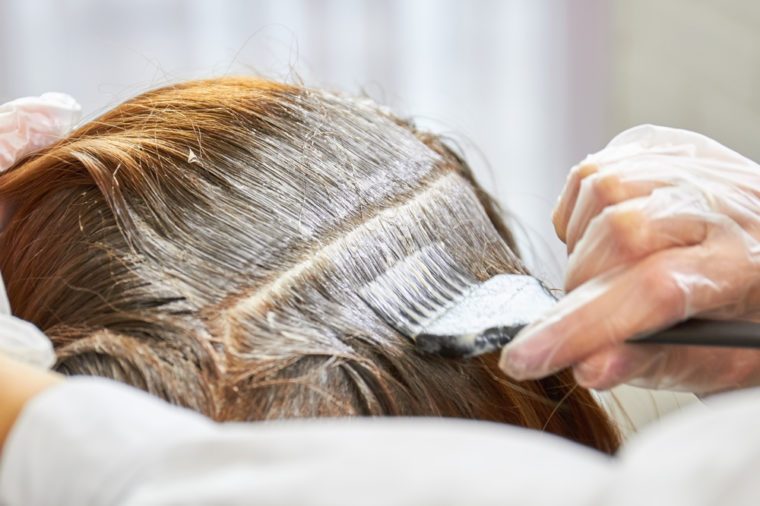 DenisProduction.com/Shutterstock
DenisProduction.com/Shutterstock
Some studies indicate that constant exposure to dyes can put hairdressers and barbers at a higher risk of bladder cancer. Not true—there’s no scientific evidence that coloring your hair—even regularly—increases your risk of cancer. The only reason to extend the time between hair coloring appointments is to save time and expense.
Check out these hopeful cancer statistics everyone should know.
Shampoo
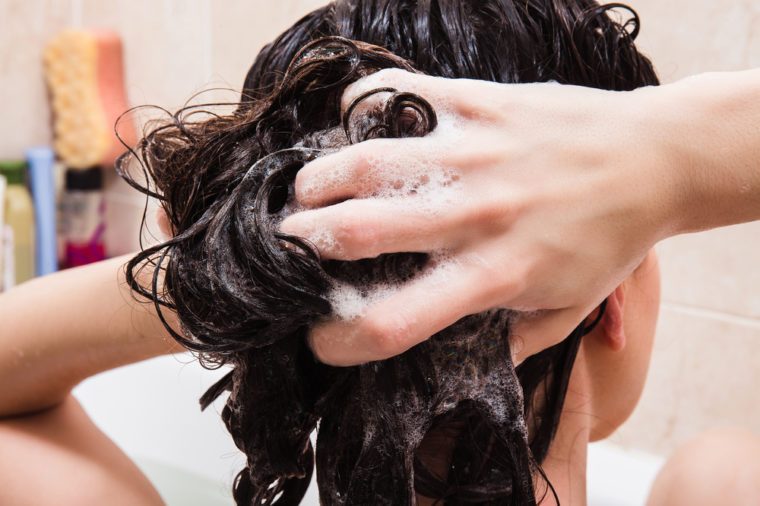 Goncharov_Artem/Shutterstock
Goncharov_Artem/Shutterstock
Occasionally the idea crops up that shampoo causes cancer because it contains the foaming agent sodium laureth sulfate or sodium lauryl sulfate (SLS). Also found in hair conditioner, soap, and various cleaning products, SLS may damage your hair but not your genes; it’s definitely not a carcinogen, reports the American Cancer Society.
Antiperspirant
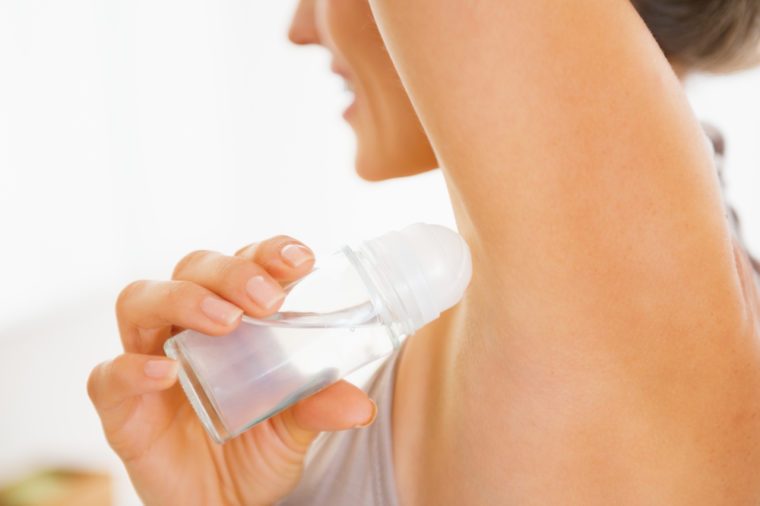 Alliance/Shutterstock
Alliance/Shutterstock
The National Cancer Institute is clear about this one: There is no truth to the rumor that antiperspirant causes cancer. “The best studies so far have found no evidence linking the chemicals typically found in antiperspirants and deodorants with changes in breast tissue,” the institute reports in a fact sheet titled Antiperspirants/Deodorants and Breast Cancer. These actual causes of cancer might surprise you, though.
Your cell phone
 Andrey_Popov/Shutterstock
Andrey_Popov/Shutterstock
People have long been suspicious of those handy devices, but there’s no need to be. As the American Cancer Society explains, cancer grows through genetic mutations, and cell phones emit a type of low-frequency energy that isn’t capable of damaging the DNA inside cells. And although researchers continue to study this potential link, there are no reputable findings linking cell phones and cancer risk. Still, while using your cell phone doesn’t cause cancer, these things do raise your cancer risk.
Power lines
 Pataradon Luangtongkum/Shutterstock
Pataradon Luangtongkum/Shutterstock
Power lines emit both electric and magnetic energy—so do they cause cancer? No, according to the National Cancer Institute’s fact sheet on Electromagnetic Fields and Cancer. “The electric energy emitted by power lines is easily shielded or weakened by walls and other objects. The magnetic energy emitted by power lines is a low-frequency form of radiation that does not damage genes.
Cold water
There’s good reason to use cold water when cooking, but if you’ve heard that drinking cold water after meals can cause cancer, you can disregard it as a silly rumor. The viral email that began the rumor involved the notion that cold water interferes with digestion, causin food to turn to cancer-causing intestinal sludge.
Nope. Just nope. There is no research backing up this claim, and it doesn’t even make scientific sense since chilled liquids do NOT cause food to turn into sludge in the body, whose internal heat nullifies any temperature difference between foods/beverages.
Boiling your water twice
You might have heard this one if you follow alternative health news, that if water is boiled for too long or reboiled, chemical compounds form, including carcinogens like arsenic. But the reality is that the risks posed by reboiling water are minimal, due to the scale of concentration needed to bring anydissolved component of water to a harmful concentration. Any water that is dangerous after re-boiling, was almost certainly dangerous to begin with. So the real question is: is your tap water safe? Here’s how to know for sure.
Turning on the AC in your car
This would be true if your car contained enough carcinogenic chemicals such as benzene to make any difference in your health at all. But there are no studies supporting the claim that well-maintained cars contain or produce benzene through their air conditioning system in sufficient quantities to have any carcinogenic impact.
E-cigarettes
You want to give up smoking cigarettes because it’s dirty, disgusting, and dangerous. So you get yourself some e-cigs to wean yourself gradually. That would be fine if e-cigs don’t cause cancer, themselves. But a few years back, a Japanese study found electronic cigarettes contain ten times as many carcinogens as tobacco cigarettes. Turned out, the study was seriously flawed. In February 2017, the UK’s National Health Service citeda study suggesting the use of electronic cigarettes is far safer than smoking. If you do decide to use e-cigs, keep these possible side effects in mind.
Dental fillings
In case you didn’t know, those cavities you had filled a while back likely have mercury in them. But they also have other metals, including silver, tin, and copper. According to the American Dental Association, the combination of these metals makes the fillings, known as dental amalgams, completely safe. “It’s important to know that when combined with the other metals, it forms a safe, stable material,” the ADA says. What’s more, the type of mercury used in the fillings isn’t the same type (methylmercury) that has been shown to cause health problems.
Do power lines cause cancer?
Lucky Charms
Lucky Charmshas an interesting list of ingredients that might (and possibly SHOULD) care you off. One of those ingredients is trisodium phosphate (or tribasic sodium phosphate; TSP), whch is found in many food items but is also used in cleaning products and paint thinners. But is that so bad, really?
No. It’s not. TSP is a leavening agent (not unlike baking soda, which is also used in foods as well as cleaning products). At the amount found in Lucky Chamrs (and other foods), there is no cancer-causing impact whatsoever.
Candy Canes
You may have heard that candy canescause cancer because they contain titanium dioxide. It’s quite likely to be true (depending on the manufacturer of your candy cane), but that doesn’t mean that candy canes cause cancer. Titanium dioxide is a pigment that imbues candy canes (as well as sunblock and toothpaste) with a brilliant, opaque white. Titanium dioxide isnota known carcinogenand hasn’t been demonstrated as posing a cancer risk to consumers through ordinary consumption of food products. And it’s a good thing because you know you can’t resist red candy (here’s why).
Nutella
Well, it aint so. Rather, it’s incorrectly based on Nutella’s inclusion of palm oil in its recipe. Palm oil can produce carcinogenic byproducts whenits heated to a certain temperature—which Nutella is never heated to. And the amount you would consume while consuming Nutella would be insigificant in any event.
That being said, we’re not convinced Nutella is as healthy as some of wished.
Takis
The Wax on Apples
Disposable chopsticks
Cold water
There’s good reason to use cold water when cooking, but if you’ve heard that drinking cold water after meals can cause cancer, you can disregard it as a silly rumor. The viral email that began the rumor involved the notion that cold water interferes with digestion, causin food to turn to cancer-causing intestinal sludge.
Nope. Just nope. There is no research backing up this claim, and it doesn’t even make scientific sense since chilled liquids do NOT cause food to turn into sludge in the body, whose internal heat nullifies any temperature difference between foods/beverages.
Boiling your water twice
You might have heard this one if you follow alternative health news, that if water is boiled for too long or reboiled, chemical compounds form, including carcinogens like arsenic. But the reality is that the risks posed by reboiling water are minimal, due to the scale of concentration needed to bring anydissolved component of water to a harmful concentration. Any water that is dangerous after re-boiling, was almost certainly dangerous to begin with. So the real question is: is your tap water safe? Here’s how to know for sure.
Turning on the AC in your car
This would be true if your car contained enough carcinogenic chemicals such as benzene to make any difference in your health at all. But there are no studies supporting the claim that well-maintained cars contain or produce benzene through their air conditioning system in sufficient quantities to have any carcinogenic impact.
E-cigarettes
You want to give up smoking cigarettes because it’s dirty, disgusting, and dangerous. So you get yourself some e-cigs to wean yourself gradually. That would be fine if e-cigs don’t cause cancer, themselves. But a few years back, a Japanese study found electronic cigarettes contain ten times as many carcinogens as tobacco cigarettes. Turned out, the study was seriously flawed. In February 2017, the UK’s National Health Service citeda study suggesting the use of electronic cigarettes is far safer than smoking. If you do decide to use e-cigs, keep these possible side effects in mind.
Dental fillings
In case you didn’t know, those cavities you had filled a while back likely have mercury in them. But they also have other metals, including silver, tin, and copper. According to the American Dental Association, the combination of these metals makes the fillings, known as dental amalgams, completely safe. “It’s important to know that when combined with the other metals, it forms a safe, stable material,” the ADA says. What’s more, the type of mercury used in the fillings isn’t the same type (methylmercury) that has been shown to cause health problems.
Do power lines cause cancer?
X-rays
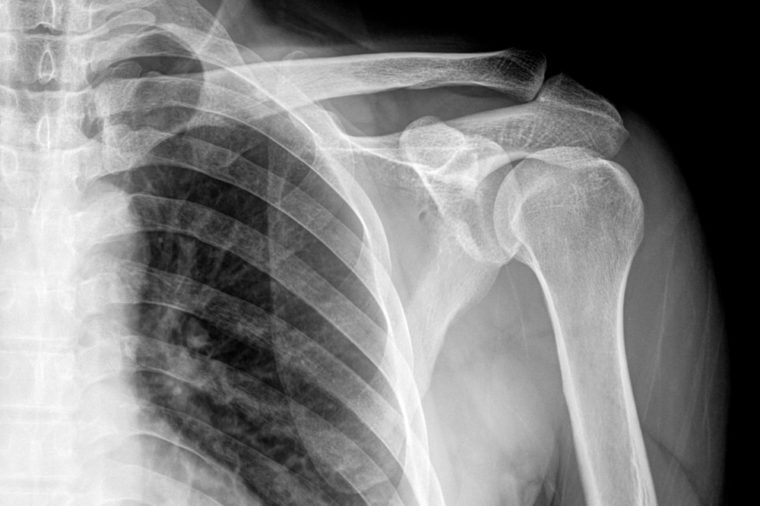 Xray Computer/Shutterstock
Xray Computer/Shutterstock
Yes, radiation is part of the procedure. But the amount of radiation from a single X-ray is relatively small, says Sailaja Kamaraju, MD, MS, assistant professor of medicine at the Medical College of Wisconsin. In fact, the radiation dose from a single X-ray is less than the average dose of background radiation you’ll get at your office over a year’s time. In other words, X-rays do not cause cancer. Turning down an X-ray could put you at risk, though: A missed tumor can spread and become deadly, for example.
Mammograms
 Tyler Olson/Shutterstock
Tyler Olson/Shutterstock
A mammogram is an X-ray of the breast that can help detect breast cancer early. The procedure involves compressing the breast (often uncomfortably), and there are women who fear that that breast compression may cause breast cancer to spread. Others believe that the radiation emitted by mammography can cause breast cancer. Neither is true, according to the National Cancer Institute. Their experts point out: “The benefits of mammography… nearly always outweigh the potential harm from the radiation exposure. Mammograms require very small doses of radiation. The risk of harm from this radiation exposure is extremely low.” Here’s what oncologists do to prevent cancer.
Injury to the breast
This supposed wisdom has been around for years: An injury to the breast, such as falling or being hit in the chest, can cause breast cancer. While an injury to the breast may cause bruising and swelling—or even a benign lump known as fat necrosis—it won’t cause breast cancer.
Your bra
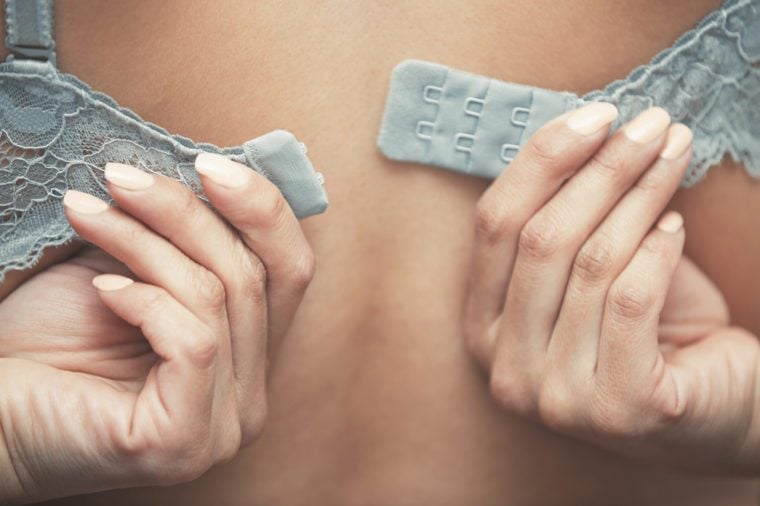 Arman Zhenikeyev/Shutterstock
Arman Zhenikeyev/Shutterstock
“The fact is that underwire bras do not cause breast cancer,” Marisa Weiss, MD, told Reader’s Digest. She should know: Dr. Weiss is chief medical officer and president and founder of breastcancer.org. A 2014 scientific study looked into the supposed link between underwire bras and breast cancer, and it could detect no difference in breast cancer rates among women who wore a bar versus women who didn’t.
Don’t miss these 30 simple ways you can prevent cancer.
Abortion
 Rocketclips, Inc./Shutterstock
Rocketclips, Inc./Shutterstock
The claim that undergoing an abortion increases a woman’s chances of developing breast cancer may have its roots in the notion that women who give birth for the first time after the age of 30 are at an increased risk of breast cancer. But the scientific reality is that women who’ve had an abortion are no more likely to get breast cancer than women who have not.
Slicing a tumor causes it to spread
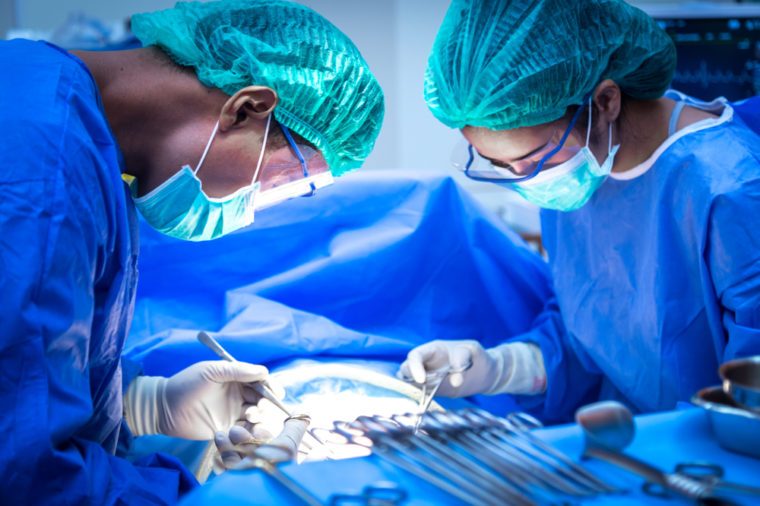 A_stockphoto/Shutterstock
A_stockphoto/Shutterstock
In 2005, nearly 41 percent of people surveyed by the American Cancer Society said they believed that surgery to remove cancer actually caused cancer to spread, and an additional 13 percent weren’t sure. Guess what? Cutting into cancer does not cause it to spread. First, surgeons use special protocols to prevent cancer cells from migrating during surgical procedures. Second, cancer replicates and metastasizes on its own, not with the help of a scalpel. Here are some other cancer myths that need to be “removed” from our brains.
Exposure to air causes cancer to spread
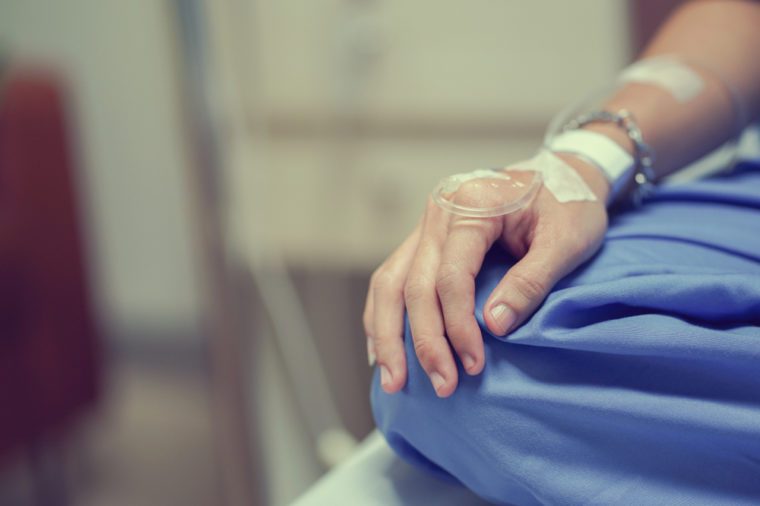 chainarong06/Shutterstock
chainarong06/Shutterstock
Here’s another incorrect and potentially dangerous belief about cancer: that exposing it to air (via surgery or otherwise) makes it grow and spread. “There’s no scientific data supporting that theory,” says Blair Marshall, MD, thoracic surgeon, on oncolink.com. Dr. Marshall writes that the theory stems from situations where cancer patients have surgery and then later die of metastatic cancer. “In actuality,” Dr. Marshall reports, “if the patient had not undergone any surgery at all, they still would have developed widespread disease.” This belief is more prevalent and difficult to “disentangle” in “underserved groups,” according to this study, and may contribute to disparities in cancer outcomes.
Your bad attitude
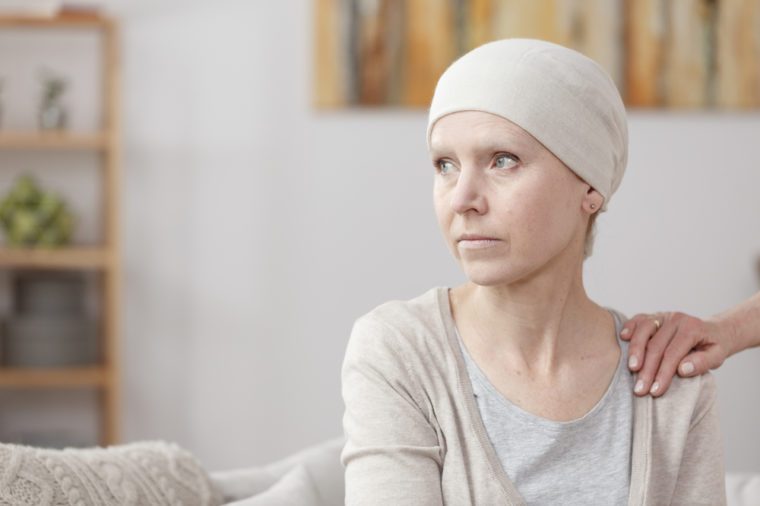 Photographee.eu/Shutterstock
Photographee.eu/Shutterstock
“To date, there is no convincing scientific evidence that links a person’s ‘attitude’ to his or her risk of developing or dying from cancer,” according to the National Cancer Institute. “If you have cancer, it’s normal to feel sad, angry, or discouraged sometimes, and positive or upbeat at other times.” And none of it is the cause of the cancer, and none of it will directly impact the disease progression.
Next, be sure to check out these 37 ways to cut your cancer risk.
Reader Interactions
- লিঙ্ক পান
- X
- ইমেল
- অন্যান্য অ্যাপ

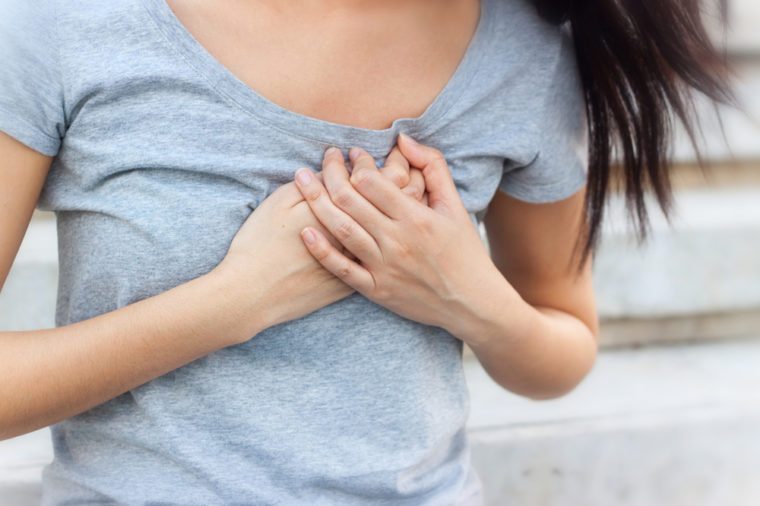
মন্তব্যসমূহ
একটি মন্তব্য পোস্ট করুন